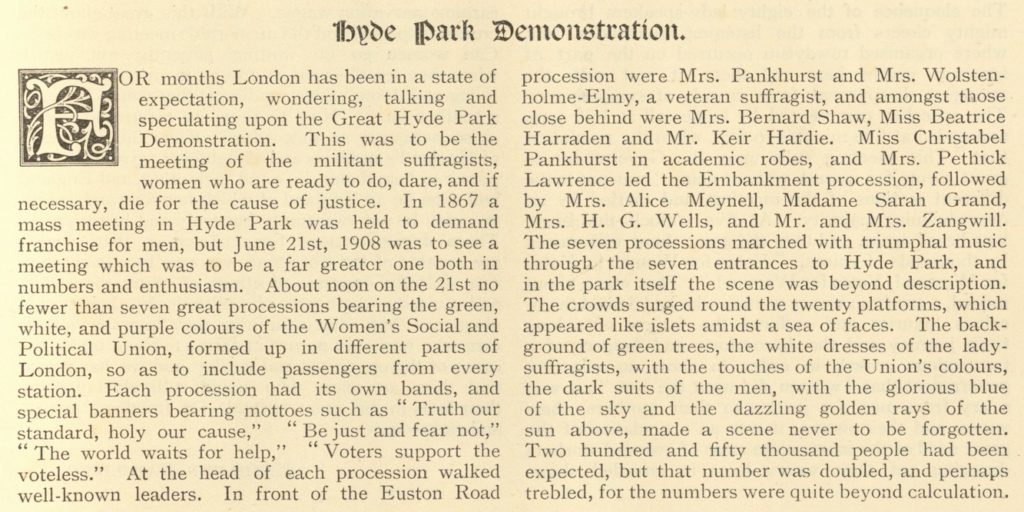By 1908, the campaign for women’s suffrage (the right of women to vote in elections) had been underway in Britain for well over 50 years and the movement encompassed a very wide range of views, opinions and approaches to achieving the aim of getting the vote.
Broadly speaking, the campaign in the years immediately before the First World War (1914-1918) is often divided between suffragists, who sought peaceful change through the law, and suffragettes, who believed that change would be achieved through “deeds, not words” (the motto of the Women’s Social and Political Union, formed by Emmeline and Christabel Pankhurst in 1903).
This article by Kathleen Ratcliffe (a student at Edge Hill from 1905-07) is from the 1908 edition of the Edge Hill College Magazine and was one of two articles that were printed describing mass women’s suffrage demonstrations that took place in London in June of that year. Helena Normanton, another former student (and one who would go on to become a hugely significant figure in the development of women’s rights and the British legal system), describes the experience of marching with suffragists through London on 13th June. It is interesting to note that Normanton’s only use of the term suffragette is to say that this is the term that many newspapers “delight to call” militant suffragists; suggesting that the differentiation between suffragist and suffragette was not as commonly made in 1908 and that suffragette was being used to somehow belittle the activists. Both Ratcliffe and Normanton have obvious sympathies for the increasingly militant activities of some suffragists, with Normanton, for example, reflecting that “women have been asking in a nice polite way for this great reform” for over fifty years and that now it has “dawned on them that they were being made the victims of their own sweet reasonableness.” Ratcliffe, meanwhile, includes herself among those “who would willingly lay down their lives in this great struggle for freedom, justice and righteousness.”


Ratcliffe’s article is a wonderful description of a “mass meeting” that took place on 21st June 1908, the week after the event that Normanton attended. Both events were crucial moments in the fight for women’s suffrage, with the 21st June demonstration becoming known as “Women’s Sunday”, attended by around 500,000 people and receiving a great deal of media coverage at the time.
Ratcliffe successfully conveys the excitement of attending an event of such historic significance and she is clearly inspired by what she sees and hears, with her writing quickly taking on the form and style of a brilliantly passionate speech: you can imagine this being read out loud to a crowd of people.
After reading Kathleen’s article, you might want to write a short historical piece about women’s suffrage or about the lives of women in this period and how things have changed since. You may want to write a short piece of fiction or a poem inspired by Kathleen’s words. Perhaps you may be inspired to create some kind of artwork about the fight for equality that Kathleen and Helena were part of.
